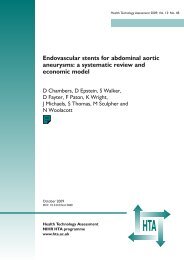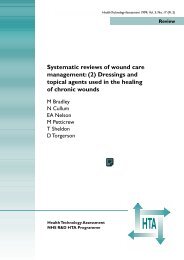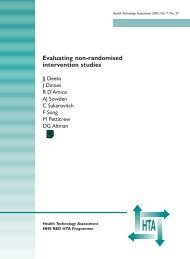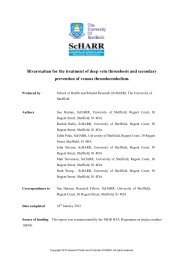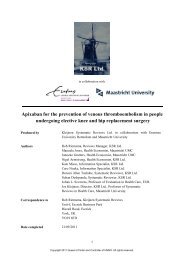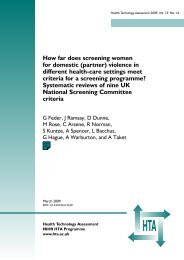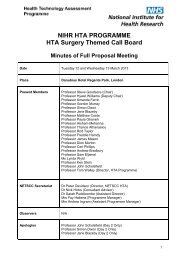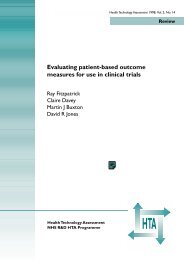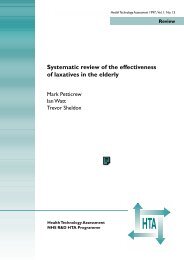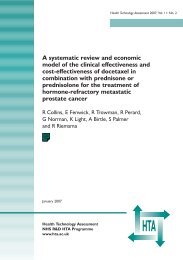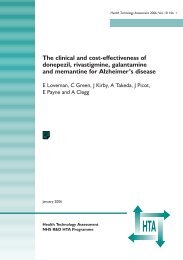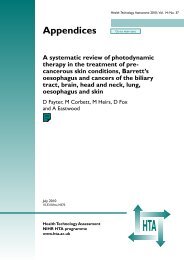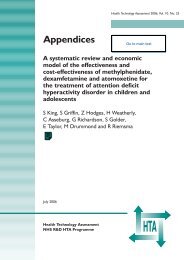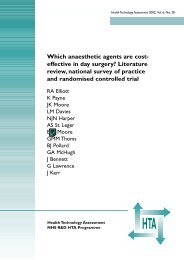A systematic review and economic model of the effectiveness and ...
A systematic review and economic model of the effectiveness and ...
A systematic review and economic model of the effectiveness and ...
Create successful ePaper yourself
Turn your PDF publications into a flip-book with our unique Google optimized e-Paper software.
showed persisting significant superiority over<br />
behavioural treatment <strong>and</strong> community care for<br />
ADHD <strong>and</strong> oppositional–defiant symptoms at<br />
24 months, although not as great as at 14 months.<br />
Significant additional benefits <strong>of</strong> combined<br />
treatment over medication management <strong>and</strong> <strong>of</strong><br />
behavioural treatment over community care were<br />
not found. The groups differed significantly in<br />
mean dose (MPH equivalents: 30.4, 37.5, 25.7 <strong>and</strong><br />
24.0 mg/day, respectively). 113<br />
Summary <strong>of</strong> clinical <strong>effectiveness</strong><br />
data<br />
MPH versus placebo<br />
Studies that evaluated low-dose MPH compared<br />
with placebo demonstrated variable results for<br />
hyperactivity. 43,54,55,60,61,96 No differences in CGI<br />
were reported between <strong>the</strong> groups96 (no o<strong>the</strong>r<br />
studies measured this outcome). With mediumdose<br />
MPH, <strong>the</strong> majority <strong>of</strong> studies demonstrated<br />
that MPH was superior to placebo for<br />
hyperactivity; 42,43,46,54,60,61,68,98 (no results were<br />
significant in <strong>the</strong> study by Stein <strong>and</strong> colleagues91 ),<br />
<strong>and</strong> one study reported that MPH improved CGI<br />
compared with placebo83 (no o<strong>the</strong>r studies<br />
measured this outcome). The two studies that<br />
evaluated hyperactivity with high-dose MPH<br />
demonstrated variable results, 43,77 although <strong>the</strong>re<br />
was evidence that high-dose MPH improved<br />
CGI. 97 [Confidential information from one study<br />
that evaluated <strong>the</strong> <strong>effectiveness</strong> <strong>of</strong> high-dose<br />
MPH on CGI removed].<br />
There was a paucity <strong>of</strong> studies that examined<br />
MPH (any dose) plus a non-drug intervention<br />
(e.g. cognitive <strong>the</strong>rapy) compared with placebo.<br />
Only one study reported data for hyperactivity,<br />
<strong>and</strong> <strong>the</strong> results were not significant. 42 In addition,<br />
very few studies examined <strong>the</strong> <strong>effectiveness</strong> <strong>of</strong><br />
ER-MPH compared with placebo. Of <strong>the</strong>se studies,<br />
<strong>the</strong> majority reported that ER-MPH (low, medium<br />
or high) was superior to placebo for all outcomes<br />
<strong>of</strong> interest (hyperactivity 55;97 <strong>and</strong> CGI 59,93,97 ).<br />
[Confidential information from one study that<br />
reported on CGI removed].<br />
Again, very few studies compared MPH with a<br />
non-drug intervention (e.g. parent training,<br />
cognitive training <strong>and</strong> behavioural <strong>the</strong>rapy).<br />
Three studies evaluated hyperactivity, two <strong>of</strong> which<br />
demonstrated that children receiving MPH were<br />
significantly improved compared with children<br />
receiving a non-drug intervention 42,53 <strong>and</strong> one<br />
which demonstrated variable results depending on<br />
<strong>the</strong> scale used. 65<br />
© Queen’s Printer <strong>and</strong> Controller <strong>of</strong> HMSO 2006. All rights reserved.<br />
Health Technology Assessment 2006; Vol. 10: No. 23<br />
A larger number <strong>of</strong> studies examined MPH in<br />
combination with a non-drug intervention (e.g.<br />
parent training, one-to-one reading <strong>the</strong>rapy,<br />
cognitive <strong>the</strong>rapy <strong>and</strong> parent <strong>and</strong> teacher<br />
education) compared with a non-drug intervention.<br />
Of <strong>the</strong>se, five presented reproducible results on<br />
hyperactivity <strong>and</strong> two reported results on CGS.<br />
Generally, combined treatment was superior to<br />
non-drug treatment for hyperactivity 42,53,71 <strong>and</strong><br />
Clinical Global Impression. 51,65 In two studies,<br />
hyperactivity was improved when assessed by<br />
teachers, but not by parents 65,86 (in <strong>the</strong>se cases <strong>the</strong><br />
non-drug interventions were parent training or<br />
support <strong>and</strong> parent <strong>and</strong> teacher education).<br />
No studies that compared ER-MPH plus non-drug<br />
intervention with a non-drug intervention<br />
evaluated hyperactivity or CGI.<br />
Generally, <strong>the</strong> studies that evaluated MPH did not<br />
adequately report on study methodology, <strong>and</strong> <strong>the</strong><br />
results should be interpreted with caution.<br />
DEX versus placebo<br />
Only two studies that compared DEX <strong>and</strong> placebo<br />
reported reproducible data on hyperactivity. 36,45<br />
When assessing <strong>the</strong> efficacy <strong>of</strong> medium-dose DEX,<br />
<strong>the</strong> results for hyperactivity varied depending on <strong>the</strong><br />
scale used. 45 For higher dose DEX, hyperactivity<br />
<strong>and</strong> CGI appeared to be improved with drug<br />
treatment 36 (statistical results for hyperactivity<br />
were not reported). Generally, this study rated well<br />
in <strong>the</strong> quality assessement. An additional study by<br />
Arnold <strong>and</strong> colleagues 38 evaluated DEX-TR<br />
compared with placebo. They observed significant<br />
improvements in hyperactivity with treatment.<br />
However, owing to <strong>the</strong> poor reporting <strong>of</strong> some<br />
methodological criteria, <strong>the</strong> results from this study<br />
should be interpreted with caution.<br />
No studies comparing DEX plus non-drug<br />
treatment versus placebo or DEX versus non-drug<br />
intervention, measured hyperactivity or CGI as<br />
outcome measures. One study compared DEX in<br />
combination with a non-drug treatment (academic<br />
instruction <strong>and</strong> <strong>the</strong>rapeutic recreation) with nondrug<br />
treatment alone with hyperactivity as an<br />
outcome. 62 Results were significant in favour <strong>of</strong> <strong>the</strong><br />
combined treatment group when assessed using<br />
<strong>the</strong> CTRS <strong>and</strong> <strong>the</strong> Children’s Psychiatric Rating<br />
Scale, but not when assessed using <strong>the</strong> CPRS. CGI<br />
was not examined. In addition to evaluating<br />
immediate release DEX, James <strong>and</strong> colleagues 62<br />
also examined DEX-SR. In this study, combination<br />
treatment resulted in improved behaviour<br />
compared with non-drug treatment alone.<br />
However, this study did not score very well in <strong>the</strong><br />
75



